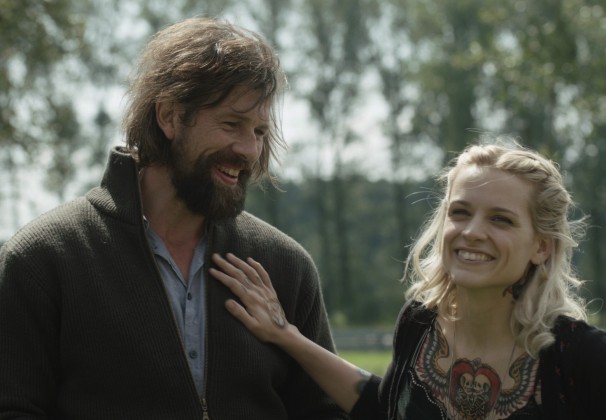
A soundtrack of foot-stomping bluegrass and heart-wrenching ballads narrates a passionate relationship that spirals into ruin in “The Broken Circle Breakdown.” Belgian director Felix Van Groeningen takes a nonlinear approach, using emotion rather than plot to guide this effective drama.
Based on a play, “Breakdown” throws its viewer right into the tragedy. At the film’s start, Didier (Johan Heldenbergh), a bohemian cowboy, and Elise (Veerle Baetens), a passionate, rebellious tattoo artist, have discovered that their daughter Maybelle (Nell Cattryse) has a terminal disease. The film then flashes back to when Didier and Elise fell in love and subsequently suffered the consequences of their romance.
Bluegrass music becomes one of the elements that links the depressing aspects of “Breakdown.” The musical cues allow the film to explore several different ideas — from the meaning of the American lifestyle to parenthood and, ultimately, consolation.
The bluegrass score is entirely composed by Bjorn Eriksson, who also plays one of Didier’s friends. He’s not the only cast member who performs dual roles for the film — Heldenbergh and Baetens also sing. Their music is so captivating that the viewer can’t help but fall in love with them.
“Breakdown” is also able to hit all the right notes on a technical level. Editor Nico Leunen intricately weaves a seven-year story from Didier and Elise’s romantic beginning to their breakup.
Groeningen doesn’t hesitate to take things one step further and highlight the electrifying sexual relationship shared between Didier and Elise. A majority of the film takes place either in a hospital, on stage or on the farm, where Didier and Elise live with Maybelle. Groeningen shows viewers happy moments in each of these places, but just when the audience feels comfortable and hopeful, he rips those complacent feelings away.
As time passes and the film explores the main pair’s religious and spiritual beliefs, Didier and Elise’s true characters become apparent. Heldenbergh is terrifyingly passionate at conveying Didier’s hatred for the institution of religion.
Didier believes that he is rational and refuses to acknowledge the possibility of afterlife or a higher being. He constantly blames society for being corrupt. Baetens portrays a genuine motherly figure, but still maintains the ability to send chills down viewer’s backs.
But that is just one example of “Breakdown” complexities. Not many directors could convey such a dramatic plot through nonlinear organization, but Groeningen manages to create an exhilarating masterpiece. “Breakdown” feels honest but there’s also a thrilling uncertainty that makes for a stimulating cinematic experience. It leaves the viewer with an appreciation for life’s simplicities and the chaotic tragedies that occur every day — a beautiful, tough feat that the film seems to manage flawlessly.
A version of this article appeared in the Wednesday, Oct. 30 print edition. Mohamed Hassan is a staff writer. Email him at [email protected].






















































































































































